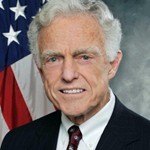Prudential Financial Inc., the second-largest U.S. life insurer, was designated systemically important in a 7-to-2 vote by a council of regulators charged with preventing another crisis.
Edward DeMarco, acting director of the Federal Housing Finance Agency, and Roy Woodall, a former Kentucky insurance regulator, opposed the designation, the U.S. Financial Stability Oversight Council said today in a document explaining the vote.

The council, led by Treasury Secretary Jacob J. Lew, initially proposed Prudential’s designation in June by the same margin. The insurer challenged the decision, prompting this week’s affirmation.
“While exposures to Prudential may be small relative to the capital of its individual counterparties, aggregate exposures are significant enough that they could amplify the risk of contagion among other financial institutions if Prudential were to experience material financial distress,” the council said.
Under FSOC rules, at least seven votes were needed to sustain the ruling.
Prudential was the first company to challenge an FSOC designation and joins American International Group Inc. and General Electric Co.’s finance unit in being labeled a non-bank systemically important financial institution. Neither AIG nor GE contested the decision. Prudential last Thursday disclosed that it lost its appeal, without stating the vote tally.
Cordray’s Role
The council also voted 9-0 to ratify actions related to Prudential while council member Richard Cordray was a recess appointee as Consumer Financial Protection Bureau director. Regulators on the council have discussed whether Cordray’s actions as a recess appointee could be challenged by companies designated systemically important and subjected to scrutiny by the Federal Reserve.
“The council is confident in the validity of its previous actions, and took this action out of an abundance of caution, in response to a challenge Prudential made to the validity of certain council actions,” Treasury spokeswoman Suzanne Elio said in an e-mailed statement today.
President Barack Obama made Cordray a recess appointment, bypassing Senate confirmation, in January 2012. Cordray was confirmed by the Senate in July of this year and released a “notice of ratification” on Aug. 27 saying he thinks the actions he took as a recess appointee “were legally authorized and entirely proper.”
Leverage, Liquidity
The Dodd-Frank Act authorized the council to designate companies that it determines could pose a threat to stability if they were to fail, subjecting them to increased oversight. The Fed can impose tighter capital, leverage and liquidity rules, and demand measures including stress-testing and wind-down plans. Fed Chairman Ben S. Bernanke is also on the FSOC.
“No large financial institution has more than a de minimus amount of its equity capital exposed to Prudential,” DeMarco said in his dissent. The FSOC’s analysis of the Newark, New Jersey-based insurer’s balance sheet “does not fully take account of the stability of Prudential’s liabilities, the quality of its assets, or the strength of its equity capital.”
Woodall, the council’s independent member with insurance expertise, said the FSOC didn’t sufficiently support the conclusion that distress at Prudential could pose a threat to financial stability.
Prudential said yesterday it has 30 days to appeal the designation in federal court. “We are currently reviewing the rationale for the determination and our options,” the insurer said in a statement.
‘Fundamental Gaps’
Jim Donelon, president of the National Association of Insurance Commissioners and Louisiana insurance commissioner, said he was “deeply troubled by the implications” of the council’s decision on Prudential and that it “shows fundamental gaps in FSOC’s understanding of the business of insurance or the regulatory regime that governs it.”
MetLife Inc., the largest U.S. life insurer, has said it’s been moved to the last stage of review to be designated systemically important.
Editors: Dan Kraut, Dan Reichl
Topics USA
Was this article valuable?
Here are more articles you may enjoy.



 Survey Shows Majority of Florida, California Homeowners Seeing Higher Insurance Costs
Survey Shows Majority of Florida, California Homeowners Seeing Higher Insurance Costs  Progressive Gains as Drivers Shop Around for Auto Insurance—Again
Progressive Gains as Drivers Shop Around for Auto Insurance—Again  Former Congressman Charged After Collision with State Trooper in Florida
Former Congressman Charged After Collision with State Trooper in Florida  JPMorgan Client Who Lost $50 Million Fortune Faces Court Setback
JPMorgan Client Who Lost $50 Million Fortune Faces Court Setback 

